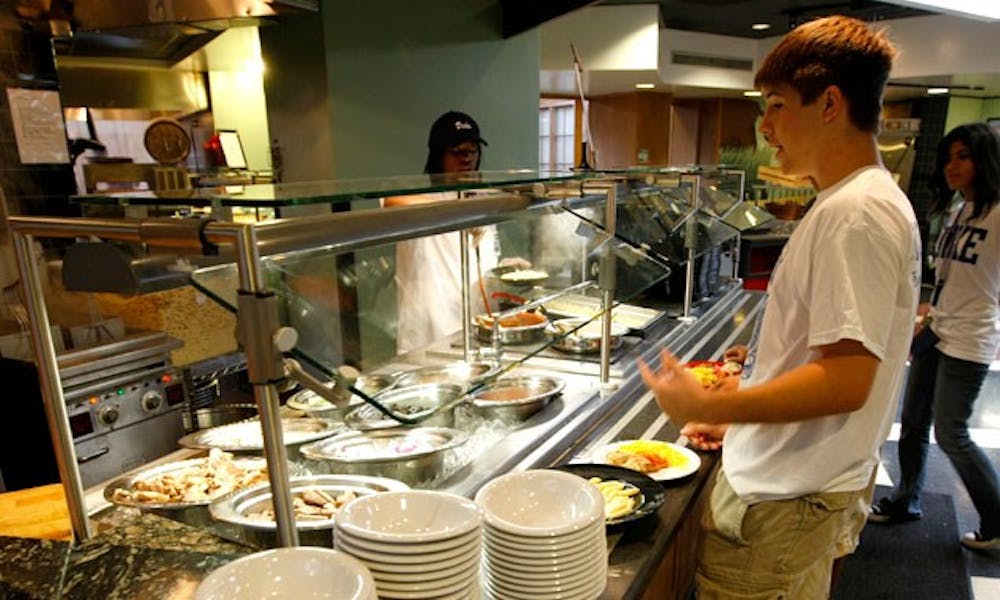Administrators and students involved in rethinking Duke Dining have said little about their negotiations to reduce the deficit.
Vice President for Campus Services Kemel Dawkins met behind closed doors with Duke Student Government President Awa Nur and two other DSG leaders to discuss the state of Duke Dining Services. Dawkins and Director of Dining Services Jim Wulforst have declined to discuss possible changes.
Although Thursday’s meeting did not yield a plan for dealing with the $2 million deficit facing Dining Services, Nur, a senior, said every aspect of Dining is under close scrutiny.
“Nothing is safe,” she said. “This is a huge problem affecting Dining, we would be remiss in not looking at everything in trying to solve this deficit.”
Nur said she plans to present more ideas to administrators in a meeting Tuesday. Potential solutions could include changes to both the freshman and upperclassman dining plans.
The first plan proposed by administrators, called Directed Choice, would have required students to spend 500 to 700 food points at the six Bon Appétit Management Company vendors, Nur said in December. She said she would work to block this plan.
Executive Vice President Tallman Trask said Jan. 22 that Directed Choice is no longer under consideration.
A proposed 6 percent “tax” on contracted-vendor food purchases is also off the table, Nur said, calling it “another form of Directed Choice.”
Nur said there is talk of “reworking” the freshman meal plan. She said administrators and students have discussed increasing the number of Marketplace meals per week to 19 from 12, but the plan was rejected. She added that increases to the plan’s price also have not been agreed upon.
Still, Trask said he anticipates freshmen will have to purchase a larger meal plan. Administrators and DSG are now looking for “a fair way for non-freshman undergraduates to participate in the solution,” he said.
Nur said administrators and student leaders are discussing increasing the size of the smallest plan offered to upperclassmen and eliminating food point refunds. She said a new plan would not include both options.
Dining has operated under a $2 million annual deficit for more than two years, largely as a result of a switch from ARAMARK Corp. to the caterer Bon Appétit, Trask told The Chronicle in April 2009.
“[The deficit] is basically the result of deciding three years ago we wanted better food,” Trask said in April. “When we switched vendors the price went up about $2 million. We decided not to pass it on to students but to try to pay for it out of central funds. The problem we have now is we don’t have any more central funds.”
In April, Trask said officials hoped to announce changes to dining in early 2010 and implement a plan for Fall 2010.
Nur said Thursday that the timeline for eliminating the deficit has changed—the University will work to reduce the deficit by $1.5 million over two years.
Throughout the process, Nur said DSG has served as an active participant in discussions as a representative of students.
“Contrary to how it’s looked, there has been plenty of student involvement,” she said. “We’ve had regular meetings with the administration starting in September up to now, and they’ve listened to us.”
Contracted vendors that could be affected by changes to Dining have not been part of discussions. Managers and owners of several campus eateries, including Alpine Bagels, Armadillo Grill, The Loop, The Refectory and Tommy’s Rubs and Grubs, said they have not received any official communication.
“I think Duke will come to a happy medium,” said Steve Eller, director of operations at Alpine Bagels. “We haven’t put a lot of thought to it, the only thing we’ve heard or thought about was what’s in the newspapers.”
Refectory owner Laura Hall said she too has only heard rumors about changes to Dining. She said that ultimately, student preference should direct the change.
“We’re successful, we pay our dues to Duke, so they do well with us,” Hall said. “People shouldn’t mess with success.”
Tommy’s owner Tom Meyer said that although he is opposed to taking dining options away from students, he supports making Dining profitable for the University.
“It is revenue that the University needs to maintain campus life, but it’s revenue that independent vendors, like me, need to keep our own businesses,” Meyer said. “I’m sympathetic to what Jim [Wulforst] has to go through.”
Sanette Tanaka contributed reporting.
Get The Chronicle straight to your inbox
Signup for our weekly newsletter. Cancel at any time.

